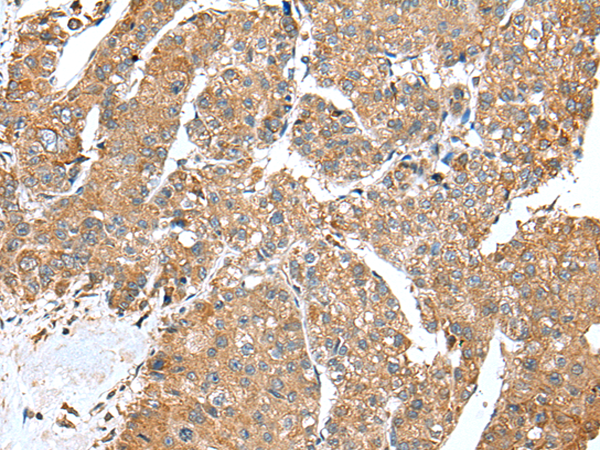
| WB | 咨询技术 | Human,Mouse,Rat |
| IF | 咨询技术 | Human,Mouse,Rat |
| IHC | 1/25-1/100 | Human,Mouse,Rat |
| ICC | 技术咨询 | Human,Mouse,Rat |
| FCM | 咨询技术 | Human,Mouse,Rat |
| Elisa | 1/2000-1/5000 | Human,Mouse,Rat |
| Aliases | ACS3; FACL3; PRO2194 |
| Host/Isotype | Rabbit IgG |
| Antibody Type | Primary antibody |
| Storage | Store at 4°C short term. Aliquot and store at -20°C long term. Avoid freeze/thaw cycles. |
| Species Reactivity | Human, Mouse, Rat |
| Immunogen | Synthetic peptide of human ACSL3 |
| Formulation | Purified antibody in PBS with 0.05% sodium azide and 50% glycerol. |
+ +
以下是关于ACSL3抗体的3篇参考文献的简要列举:
1. **文献名称**:*ACSL3 promotes prostate cancer progression by activating the Wnt/β-catenin signaling pathway*
**作者**:Li Y, et al.
**摘要**:本研究利用ACSL3特异性抗体进行免疫印迹和免疫荧光实验,发现ACSL3在前列腺癌组织中高表达,并通过激活Wnt/β-catenin通路促进肿瘤增殖和转移。
2. **文献名称**:*The role of ACSL3 in lipid metabolism and lung adenocarcinoma development*
**作者**:Wang H, et al.
**摘要**:通过免疫组化分析ACSL3蛋白表达,作者发现ACSL3通过调控脂质合成促进肺腺癌细胞存活,其抗体被用于验证基因敲除模型中蛋白水平的变化。
3. **文献名称**:*ACSL3-mediated ferroptosis resistance as a therapeutic target in hepatocellular carcinoma*
**作者**:Zhang X, et al.
**摘要**:该研究使用ACSL3抗体进行流式细胞术和Western blot,证实ACSL3通过抑制铁死亡(ferroptosis)增强肝癌细胞化疗耐药性,靶向ACSL3可改善治疗效果。
以上研究均依赖ACSL3抗体进行蛋白功能验证,并揭示了其在肿瘤代谢和信号通路中的关键作用。
**Background of ACSL3 Antibody**
ACSL3 (Acyl-CoA Synthetase Long-Chain Family Member 3) is an enzyme that activates long-chain fatty acids by converting them into acyl-CoA esters, a critical step in lipid metabolism. This protein is integral to cellular processes such as energy production, membrane synthesis, and signaling. ACSL3 is localized to the endoplasmic reticulum and lipid droplets, reflecting its role in lipid storage and utilization. Dysregulation of ACSL3 has been implicated in metabolic disorders, cancer, and neurodegenerative diseases.
ACSL3 antibodies are essential tools for studying the enzyme's expression, localization, and function. They enable detection of ACSL3 in various experimental setups, including Western blotting, immunohistochemistry, and immunofluorescence. Research using these antibodies has revealed elevated ACSL3 levels in cancers like hepatocellular carcinoma and prostate cancer, where it promotes tumor growth by enhancing lipid biosynthesis. In metabolic contexts, ACSL3 is linked to insulin resistance and obesity, highlighting its therapeutic potential.
Commercially available ACSL3 antibodies are typically validated for specificity and sensitivity, targeting unique epitopes to avoid cross-reactivity with other ACSL isoforms. Recent studies also explore ACSL3's role in viral infections, such as hepatitis C, where it facilitates viral replication by modulating lipid droplet dynamics. Continued use of ACSL3 antibodies in research may uncover novel biomarkers or therapeutic targets for diseases driven by lipid metabolic dysregulation.
×